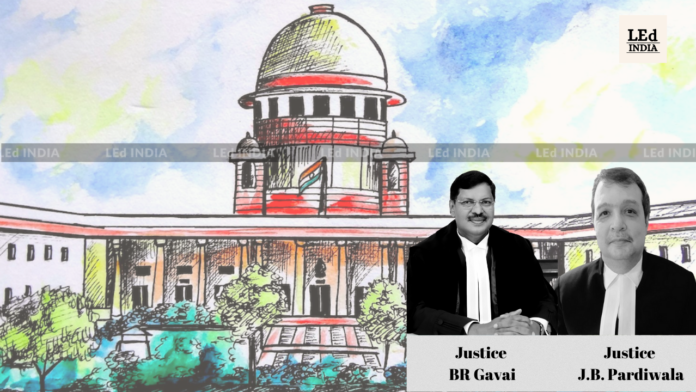In a significant legal development, the Supreme Court of India has rejected a Special Leave Petition filed by an Assistant General Manager of the State Bank of India (SBI) who was seeking discharge from charges related to alleged bank fraud. The petitioner had invoked Section 197 of the Criminal Procedure Code (CrPC), claiming that the lack of sanction by the appropriate authority rendered the charges untenable. The bench, comprising Justice B.R. Gavai and Justice J.B. Pardiwala, underscored that the applicability of Section 197 in the case of a Manager of a Nationalised Bank had already been settled, emphasizing that such public servants cannot avail themselves of this protection.
The case in question involved allegations of bank fraud where the Assistant General Manager, posted at SBI’s Hyderabad branch, was accused of conspiring with others to facilitate a corporate loan of Rs. 22.50 crore to M/s Sven Genetech Limited, Secunderabad. The Central Bureau of Investigation (CBI) registered a First Information Report (FIR) under the Indian Penal Code (IPC) and the Prevention of Corruption Act.
The core contention rested on whether the petitioner, a public servant, could claim immunity from prosecution under Section 197 of the CrPC, which applies to cases where a public servant can only be removed from office with government approval. The Supreme Court reinforced that this provision doesn’t extend to public servants employed in Nationalised Banks, given their distinct nature of employment.
The court’s judgment highlighted that Section 197 of the CrPC pertains to offenses committed while performing official duties that require government-sanctioned removal from office. The court firmly asserted that engaging in criminal activities punishable under the law can never be considered part of an official duty.
Advocate D. Ramakrishna Reddy represented the petitioner, while Additional Solicitor General Aishwarya Bhatia and Advocate-on-Record and Standing Counsel Siddharth Sangal appeared for the CBI and the State Bank of India respectively.
Previously, the High Court had allowed a petition filed by the appellant, stating that the authority that had initially declined to sanction prosecution could not later review its decision and grant fresh sanctions. Consequently, the Special Court discharged the appellant from offenses under the Prevention of Corruption Act but retained charges under the IPC.
The Supreme Court’s decision establishes a clear precedent regarding the application of Section 197 of the CrPC to public servants in Nationalised Banks. The ruling carries significant implications for cases involving similar legal issues and underscores the Court’s stance against the misuse of official duties to justify criminal actions.
As this case unfolds, legal experts and stakeholders are likely to closely analyze its implications on future proceedings involving public servants and banking institutions.

